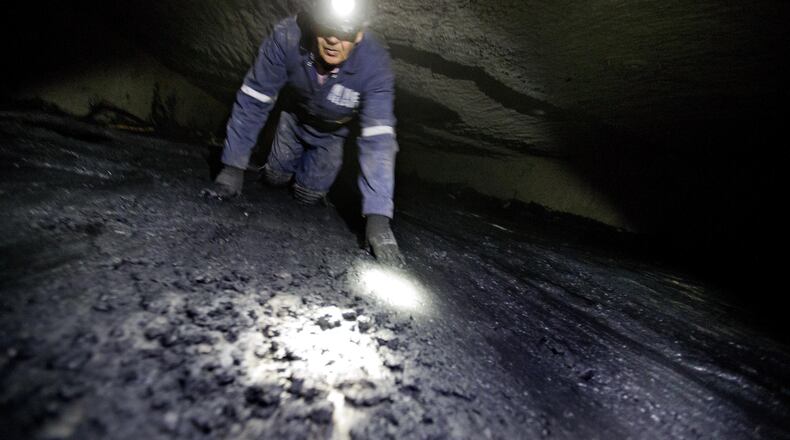Dilly is one of nearly 100,000 coal miners who are at risk of losing all or part of their pensions by 2022 — sooner if more coal companies declare bankruptcy. This week, he and dozens of coal miners canvassed Capitol Hill, asking lawmakers to pass a bill that would make their pensions whole.
Miners argue that the federal government accepted the responsibility starting in 1946, when President Harry Truman signed an executive order creating a welfare and retirement fund for miners after a nationwide United Mine Workers strike.
The current pension was created in 1974. It fared well until the 2008 recession, which caused the miners’ pension fund to lose $2 billion, according to United Mine Workers of America President Cecil Roberts. A series of bankruptcies after that cost another $4 billion, Roberts said. Now, the pensions of about 87,000 retirees and 20,000 working miners are at risk.
Should the fund become insolvent, the federal Pension Benefit Guaranty Corporation, the federal agency aimed at protecting pensions, will be tasked with trying to pick up the slack. Lawmakers worry it will not be able to sufficiently sustain those miners currently receiving a pension, and that the failure of the miners’ pension fund could have a domino effect that would cause the PBGC itself to fail.
“We are the tip of the spear,” said Dilly.
Sen. Joe Manchin, D-West Virginia, has introduced a bill that would transfer excess money from the Abandoned Mine Land fund to shore up the pension. Sen. Sherrod Brown, D-Ohio has co-sponsored the bill.
At a press conference urging passage of the bill, Manchin said the bill has bipartisan support, but needs Senate leadership in order to get a vote.
“Put it on the table, Mitch,” he said to Senate Majority Leader Mitch McConnell, R–Ky. “Let us vote.”
Brown, who cosponsored a similar bill led by Sen. Shelley Moore Capito, R–W.Va., said all the miners are asking for is a “modest” pension — the average benefit is about $600 a month. He said if the fund goes insolvent, they’ll lose about 20 percent of their benefit right away, and if the PBGC goes under, they might lose 90 percent of it. “We can’t let that happen,” he said.
Brown said many of the miners being affected gave up raises at the negotiating table in order to have the pensions. “It’s up to us to ensure that these workers and their families receive the full benefits they earned over a lifetime of backbreaking work,” the Ohio Democrat said.
Dilly, 73, said he’s traveled to Washington not just because of his pensions, but because of the pensions of his fellow miners, many of whom are in ill health.
“The people who worked in the coal mines — they don’t miss the work of the coal mines, because it’s very hard, dangerous work. It’s the people you work with. They’re your brothers. That’s why we’re over here. We stick together.”
He said he’s prepared to keep coming back until the problem is solved.
“As long as we can still come over here, we’re going to keep coming up here until they get tired of us and say, ‘Okay, we’ll fix it. Now go away.’”
About the Author
